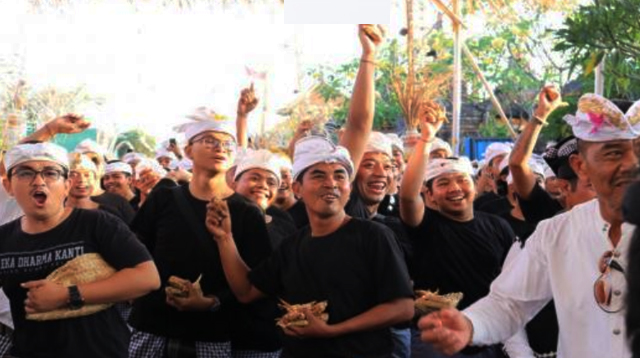PEOPLE of the Kapal customary village have a unique tradition that is second to none in Bali, namely Aci Tabuh Rah Pengangon or tipat-bantal war. Aci tabuh rah pengangon is a procession to express gratitude for the welfare given which is carried out by the Kapal customary villagers.
Tipat or ketupat is rice bag or rice wrapped in young coconut leaf plait, while bantal is pillow-like fresh cake usually made for oblation. This procession is held every year in front of the local Puseh and Desa temple, precisely on Jalan Raya Kapal, Mengwi, Badung.
Better known as the tipat-bantal war, this procession is attended by the entire community of the Kapal customary village, both young and old, who are then divided into two, namely the southern group and the northern group. Before the procession, they prayed together led by the local temple priest.
Meaning of the word
Literally, Aci Tabuh Rah Pengangon is interpreted as an offering or expression of gratitude to God in his manifestation as Lord Shiva. Then, aci is interpreted as an offering, tabuh means singing, rah means energy and pengangon here refers to Lord Shiva.
History
It is estimated that this tipat-bantal war tradition has been carried out since 1339 or the 14th century. At that time, Kapal customary village was visited by the last vice regent of the King of Bali from the Singhasari Dynasty, namely Ki Kebo Taruna or better known as Kebo Iwa. He was instructed by the King of Bali, Asta Sura Ratna Bumi Banten, to renovate a temple at Purusadha in the local village.
On another occasion, he found that the local village community was experiencing a food shortage. There he meditated and asked for guidance. Through this meditation he got the wisdom to hold Aci Rah Pengangon by offering tipat-bantal as a symbol of Purusha and Predhana (source of life) as a niskala or psychical effort to overcome famine in Kapal Village. Apart from that, it was also ordered that the people of Kapal Village not sell Tipat because it is a symbol of Predhana or Feminism Energy or Mother Earth.
This tipat-bantal war tradition is held every year from generation to generation and takes place in October. Young and old villagers participate in this event with great joy.
Prior to the ketupat war starts, people participate in prayers together. After praying, they are sprinkled with holy water (tirta) by the local temple priest. So, next the participants in the ketupat war are divided into two groups facing each other, namely the northern group and the southern group.
Implementation
When being given the command to start, they get ready and then fight. Like a real war, attacks with tipat and bantal as well as defense occurs.
As in other similar war traditions in Bali, all participants must not become emotional or angry, let alone leave feelings of revenge. Instead, cheerful smiles radiate from the participants. Dressed in traditional attires, they fight by throwing tipat and bantal at their opponents with the accompaniment of baleganjur gamelan music.
Inevitably, this war tradition presents a spectacular sight where thousands of pieces of tipat and bantal float in the air. This unique cultural event only lasts about 15 minutes. After that, the scattered tipat and bantal on the road are cleaned up.










